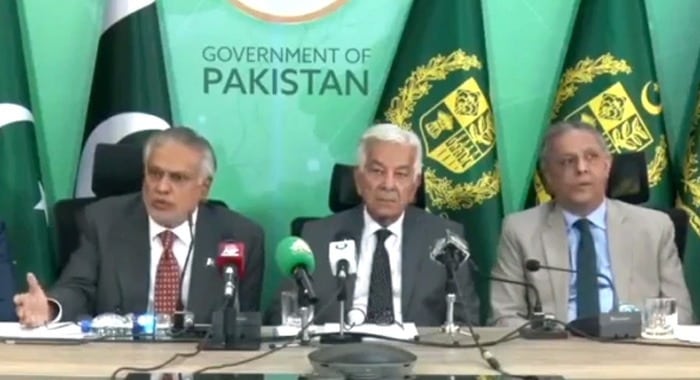Pakistan has issued a strong rebuttal to India’s aggressive posturing, warning that any unilateral move by New Delhi to abandon the Indus Waters Treaty (IWT) will not go unanswered. Deputy Prime Minister and Foreign Minister Ishaq Dar, flanked by key cabinet members, declared in a high-stakes joint press conference that Pakistan reserves the right to terminate bilateral agreements, including the landmark Shimla Accord, if India chooses to violate international commitments.
The press briefing followed a critical meeting of the National Security Committee (NSC), where both military and civilian leadership gathered to assess India’s recent escalating actions—particularly its provocative rhetoric around the Indus Waters Treaty in the wake of the Pahalgam incident.
“India cannot unilaterally revoke the Indus Waters Treaty. It is an internationally binding agreement brokered by the World Bank. If India dares to walk away, Pakistan will seriously consider ending the Shimla Agreement and other bilateral accords,” Dar asserted, while reading out the NSC’s decisions.
Firm Measures Announced
Dar announced that Pakistan has taken a series of “proportionate but firm” countermeasures in response to India’s hostile actions, including:
-
Immediate closure of Pakistani airspace for all Indian-owned and operated airlines
-
Reduction of Indian High Commission staff in Islamabad from 55 to 30 diplomats, effective April 30
-
Designation of Indian defence, naval, and air attachés in Islamabad as persona non grata, with orders to leave the country
-
Complete shutdown of the Wagah Border for cross-border movement, barring limited exceptions until April 30
“India started a media trial without any evidence. If they have proof, they should bring it forward. We won’t accept baseless blame games anymore,” Dar emphasised.
Pahalgam Incident & Indian Media Hysteria
Defence Minister Khawaja Asif accused Indian media of manufacturing hysteria following the Pahalgam incident in Kashmir, where Indian tourists were reportedly killed under mysterious circumstances.
“Interestingly, India has yet to officially name Pakistan, but its media is playing judge, jury, and executioner. This is not the first time India has tried to export terrorism narratives to play the victim card,” said Asif.
He further slammed Indian Prime Minister Narendra Modi, calling him a “certified terrorist,” referencing his controversial role in the 2002 Gujarat riots.
“Even the U.S. never banned a sitting head of government from entry — except Modi, who was once blacklisted for human rights violations,” Asif added, drawing sharp parallels.
Historical Context & Water Wars Warning
Dar also quoted former U.S. President Bill Clinton’s memoir, citing references to Indian-sponsored terrorism in the region. The Indus Water Commissioner present at the briefing clarified that even during two wars, the Indus Waters Treaty remained intact due to its irrevocable clauses.
“India’s threat is more of a political statement than a legal reality. Suspension isn’t even a provision within the treaty. But if they escalate this, we will respond through appropriate international legal forums,” the official stated.
Legal and Diplomatic Retaliation In Motion
Information Minister Atta Tarar dismissed India’s threats as “childish bluster” with no legal merit.
“India’s bullying has met a doubled response today. Our actions speak louder than their rhetoric. We’ve hit back decisively—not with words, but with concrete steps,” he said.
Tarar also pointed to the ongoing incarceration of Indian spy Kulbhushan Jadhav as “living proof” of India’s subversive actions inside Pakistan.
“India has long tried to destabilise us through proxies and false flags. But today, we’ve responded with clarity and resolve. Pakistan has settled the score—interest included,” he declared.
A Message to the Region and the World
Pakistan’s message is clear: Any threat to its sovereignty, economy, or peace will be met with a swift and strategic response. The decisions announced by the NSC reflect a decisive shift in Pakistan’s diplomatic posture, signalling that it will no longer tolerate intimidation—be it military, media-driven, or economic.
As regional tensions simmer, all eyes are now on India’s next move, while Pakistan stands firm, vowing to protect its people, its water, and its peace.





